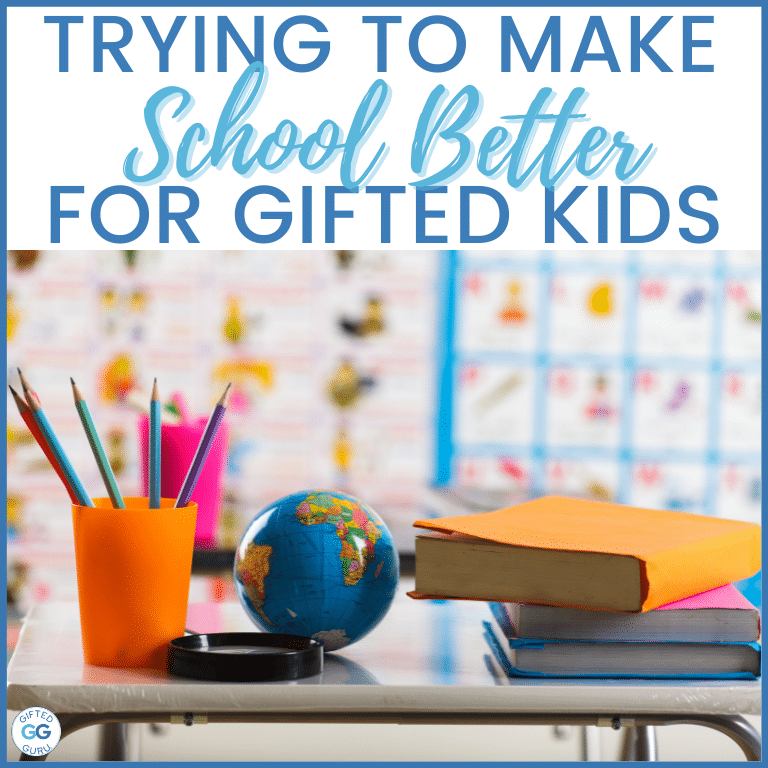Here’s a newsflash: school is not designed for gifted kids.
When you recover from the shock, read on.
Depending upon who you talk to, school is designed to:
- Create an educated (and ideally compliant) work force
- Develop productive citizens
- Provide free childcare
- Correct all of the problems created by ineffective families and societies
- Right every wrong ever done in history
None of these specifically address the needs of gifted kiddos, even though they are not immune from many of the same issues facing typically learners.
School often is the root cause of the problem
Many of the issues gifted students face in school are actually created by the school environment itself.
Among these are:
- Extreme boredom (and I have no patience for those who say this isn’t a legitimate complaint)
- Unmet expectation (expecting to actually learn something at school, but rarely actually learning anything)
- Social issues emerging from spending all day every day segregated from cognitive peers
- Emotional issues caused by feelings of marginalization
- Finding oneself at the center of conflict and contention between parents and educators, knowing that you are the cause of that conflict and contention
- Frustration created by dozens upon dozens of hours of wasted time while simultaneously feeling filled with an urgent need to actually accomplish something and make a real difference
I could probably write 6,000 words on this alone.
If you’re reading this, I’d be willing to bet you’ve seen or experienced at least some of these in your own life or you’ve seen it with your children or students.
I don’t believe that school will ever become some gifted nirvana, but I do think we can face these issues and make strides towards making school a better fit for gifted kids.
How can we change it?
Whenever a change is going to be made, the first step is to recognize the problem and admit it.
When there is more than one problem, I believe it’s imperative to identify the problem(s) that is(are) causing the most pain. If you don’t, you may find yourself spending a lot time and energy to change something, only to find that the change doesn’t result in the improvement you’d hoped.
Ask these questions
If you are a parent or educator, here are some questions to ask your child or student to get to the heart of what issues may need attention:
- What percentage of time do you spend at school bored? On a scale of 1 – 10, how much does boredom bother you?
- How many times a day do you feel you learn something you did not already know? Remember that learning something new may mean getting better at a skill you already have and are improving.
- How many other kids in your class(es) do you feel learn the same way you do? [If that number is low, ask these follow-up questions: What are some feelings that creates for you? Do you ever feel alone or lonely at school?]
- How often do you feel sad at school? How often do you wish you never had to go to school?
- If you didn’t go to school, what would you do all day?
- Do you ever feel like you can’t tell me things that happen at school or I will get upset? OR Do you ever feel you can’t tell your parents something that happened at school because they would get upset?
- What are some of the most useful things you learn at school? What are some things you wish you knew but aren’t learning yet?
- What is one thing that could change at school that you think would make you really happy?
- What is one thing that causes you distress at school that very few people would guess is a problem?
Based on that information, you can then choose an intervention to try to improve the situation. Even small changes can yield big results if those changes are ones connected to the issues causing the most pain.
If parents and educators keep very open channels of communication with kids about how they are feeling about school, we can begin to make small changes that yield big results.
You May Also Like:






